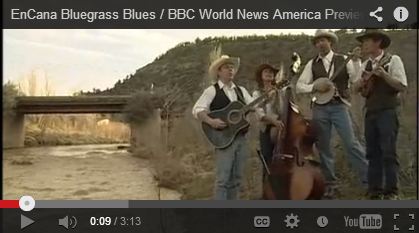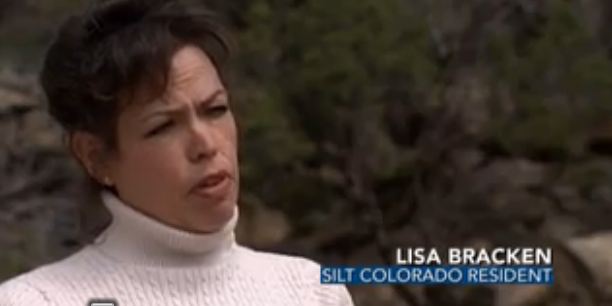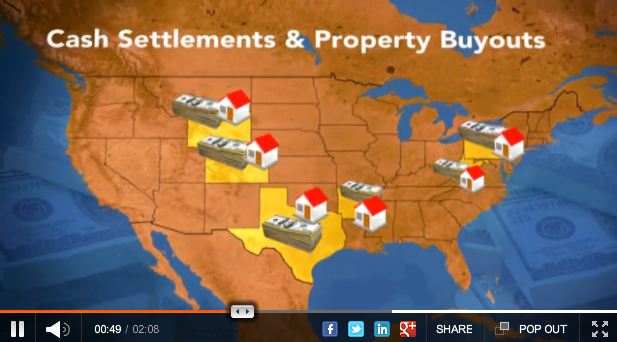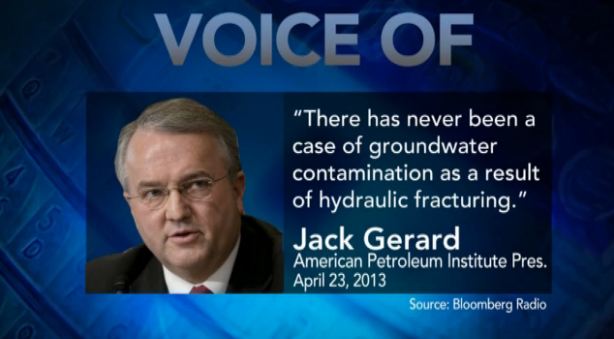Colorado case featured in report on oil and gas deals with landowners by Cathy Proctor, June 7, 2013, Energy Inc., Denver Business Journal (Energy Inc. is sponsored by EnCana)
The state concluded that the well was contaminated and fined Encana $99,400 in March 2006 for failing to prevent the contamination. Encana paid the state’s fine, even though the the company didn’t, and still doesn’t, believe it was responsible for the contamination of the Amos family’s water well, said Encana spokesman Doug Hock. Separately, the company reached a settlement agreement with the Amos family over the well contamination, which was subject to a confidentiality agreement. “It was clear to us that we hadn’t impacted her well — and we received a fine from the COGCC, which we also believed was not valid — but nonetheless we decided to move on with the issue at that point,” Hock said of the reasoning behind the settlement agreement. “At the end of the day, it’s a decision of — do you want to go through litigation and press attention? Or just settle it and move on?,” he said. “It’s a business decision, and businesses make those decisions all the time.”
Fast forward to November 2012. During the run-up to public hearings over a proposal to tighten Colorado groundwater testing rules for oil and gas companies, Matt Sura, the Boulder attorney for Western Colorado Congress (WCC), filed a motion asking the COGCC to issue a subpoena for Laura Amos to testify about her “direct experience with well water contamination” from a natural gas well. “The reason the subpoena is necessary is that Laura Amos is currently under a non-disclosure agreement and cannot, and will not, testify unless she is put under a subpoena,” Sura’s motion stated. The COGCC — in an “extremely unusual” move, according to a department spokesman — issued a subpoena on Dec. 4, 2012, for Amos to appear before the commission as a witness for the Western Colorado Congress. Encana — as well as the Colorado Petroleum Association, Chevron USA Inc., and the Colorado Oil & Gas Association — objected to the state’s subpoena because the Amos settlement with Encana included a confidentiality agreement. The COGCC held a hearing with the industry and Sura, and soon after that Sura asked the state to withdraw its subpoena for Amos. “They [Encana] threatened to sue her for everything that she settled for, and drag her back into court, if we didn’t drop our request to have her speak,” Sura said. The settlement agreement did have a clause allowing Amos to testify under subpoena, but Hock said Encana had good reasons to object to Amos’s testimony. “We felt that the Western Colorado Congress was trying to circumvent the agreement,” said Hock, who confirmed that the company did threaten to sue Amos if she testified. “When we made this agreement, we thought there would be certainty and finality on this [issue]. And we pointed out that there was a rich record at the COGCC from their proceedings in 2004-05 that could be used instead of the testimony,” he said. Amos’s written testimony is still part of the COGCC’s official record for the groundwater testing rulemaking, and it can be found on the agency’s website. And in January, after days of contentious hearings, the COGCC approved new groundwater testing rules requiring oil and gas companies to test groundwater before and after drilling occurs. State officials hailed the new rules as the tightest in the nation, while environmental groups criticized them for what they said were loopholes in the new rules. [Emphasis added]
EnCana Bluegrass Blues / BBC World News America Preview by BBCWorldNewsAmerica, April 23, 2008
David Willis took you to West Colorado where small towns there are experiencing a natural gas boom. During filming, a group of local residence played a bluegrass song that Encana took them to court to stop singing and it was thrown out of court.
EnCana racks up the fines by Dennis Webb, The Aspen Times, December 10, 2004
EnCana Oil & Gas was hit with another fine last week in connection with its operations in Garfield County. It has violated state regulations and laws in connection with 17 wells this year and been fined a total of $454,200. “Seventeen for this one company is quite a few,” said Morris Bell, operations manager for the Colorado Oil and Gas Conservation Commission. But the company promises next year will be different. EnCana spokesman Walt Lowry said this week EnCana’s goal is to be issued no notices of alleged violation by the COGCC in 2005. “It’s a dangerous business.”
WATCH: Drillers Silence Fracking Claims With Sealed Settlements by Jim Efstathiou Jr. & Mark Drajem, June 5, 2013, Bloomberg
The Hallowiches aren’t alone. In cases from Wyoming to Arkansas, Pennsylvania to Texas, drillers have agreed to cash settlements or property buyouts with people who say hydraulic fracturing, also known as fracking, ruined their water, according to a review by Bloomberg News of hundreds of regulatory and legal filings. In most cases homeowners must agree to keep quiet. The strategy keeps data from regulators, policymakers, the news media and health researchers, and makes it difficult to challenge the industry’s claim that fracking has never tainted anyone’s water. “At this point they feel they can get out of this litigation relatively cheaply,” Marc Bern, an attorney with Napoli Bern Ripka Sholnik LLP in New York who has negotiated about 30 settlements on behalf of homeowners, said in an interview. “Virtually on all of our settlements where they paid money they have requested and demanded that there be confidentiality.”
Because the agreements are almost always shrouded by non-disclosure pacts — a judge ordered the Hallowich case unsealed after media requests — no one can say for sure how many there are. Some stem from lawsuits, while others result from complaints against the drillers or with regulators that never end up in court. “We are transforming our energy infrastructure in this country from burning coal for electricity to potentially burning a lot of natural gas,” Aaron Bernstein, associate director of the Center for Health and the Global Environment at the Harvard School of Public Health, said in an interview. Non-disclosure agreements “have interfered with the ability of scientists and public health experts to understand what is at stake here.”
Confidentiality agreements are included in settlements for many reasons and don’t constitute an admission of fault, according to an industry spokesman. “The practice is common in every type of litigation in every industry,” Dan Whitten, spokesman for America’s Natural Gas Alliance, a Washington-based industry group, said in an e-mail. “It is often the case that it is less burdensome to settle — even on claims that have no merit — than to go into a protracted court battle.” One driller, Southwestern Energy Co (SWN). of Houston, said it agreed to settle a class-action complaint of water contamination in Arkansas last year only if the agreement remained open so there would be no suspicion. “If we had a confidentiality agreement, everybody would have thought ‘oh gosh, what did Southwestern do here. They got away with something and just paid these guys a pittance,’” said Mark Boling, Southwestern’s general counsel. The $600,000 the company paid three families was a fraction of what the legal fees would have been to see the case through, he said.
Legal Threat
Another driller, Encana Corp. (ECA) of Calgary, took a different approach, threatening legal action to keep details of a case out of view of the Colorado Oil and Gas Conservation Commission. Laura Amos believed gas drilling near her home in Silt, Colorado, about 160 miles (257 kilometers) west of Denver, was to blame for a tumor she developed. Encana, which owns the well, disagreed that fracking made her sick. Yet the company bought her 30-acre property in 2006 for $310,000, according to public records. Amos’ complaint and the existence, though not details, of a settlement and non-disclosure pact were disclosed in filings with the oil and gas commission. In December, the agency subpoenaed Amos to testify about a rule it was considering to require water tests. Matt Sura, an environmental attorney in Boulder, Colorado, who represented conservation groups that were seeking Amos’ testimony, said an Encana attorney told him the company would sue Amos if she talked. She didn’t want to face a lawsuit from Encana and Sura said he asked the commission to withdraw the subpoena. “She had really relevant testimony,” Sura said in an interview. “Because they’ve bought everyone’s silence, they often state that they haven’t damaged anyone.” In filings with the commission, Amos said gas drilling on a neighbor’s property in 2001 caused her water well to blow out “like a geyser at Yellowstone.” Two years later she said she developed health problems that her doctors could not explain and she believes were related to the drilling. The commission had concluded that Encana was responsible for methane in Amos’s well, though it said it found no evidence of fracking fluids in her water. Encana disputed the finding yet agreed to a $99,400 fine and to monitor the well until methane levels dropped. … “Why are they settling all these cases?” Deborah Goldberg, managing attorney with the environment group Earthjustice, said in an interview. “There’s obviously information that they don’t want to get out there.”
…
“There has never been a case of groundwater contamination as a result of hydraulic fracturing,” Jack Gerard, president of the American Petroleum Institute, a trade group representing the oil and gas industry, said in an April 23 interview with Bloomberg Radio. … Regulators in Pennsylvania, however, have linked gas and oil drilling with about 120 cases of water contamination from 2009 to 2012, according to documents obtained through a state right-to-know request.
…
The U.S. Environmental Protection Agency is conducting a long-term study of the potential impact of fracking on water. Settlement terms in the Hallowich case were unsealed over the objections of the driller, Range Resources, by Washington County Common Pleas Court Judge Debbie O’Dell-Seneca who said companies failed to show they’d suffer harm to trade secrets or reputations if the records were open.
Hallowich Case
… The Pennsylvania Department of Environmental Protection had said it “cannot conclude” that drilling contaminated the water, a finding the family disputed in its lawsuit. They alleged the agency refused to adequately investigate and outsourced some of the testing to Range Resources itself. The Hallowiches declined, through their attorney, to discuss the case. “My clients signed a confidentiality agreement,” Peter Villari, their lawyer, said in an interview. “They can’t talk to you.” …
Ruggiero Case
The outcome of Tim and Christine Ruggiero’s case remains secret — though it didn’t start out that way. For a time, they detailed their travails on a timeline posted online. The Wise County, Texas, couple had their well water tested in September 2009 before Aruba Petroleum drilled on their property, according to the timeline. The water was found safe to drink. In October, Christine Ruggiero saw a black liquid shooting from the drilling rig and had their water tested again. Those tests showed chemicals linked to gas exploration and fracking such as benzene and acetone, according to the consultant’s report, which was posted online by the anti-fracking website Earthworks. Tim Ruggiero wrote a blog post on Earthworks in January, 2012, saying: “Our ordeal living in Gasland has ended,” a reference to the 2010 film that documents alleged environmental damage from fracking. In an interview, he would only say, “The matter has been resolved.” Public records show Aruba, which is based in Plano, Texas, in late 2011 bought his home in Decatur, about 44 miles (71 kilometers) north of Fort Worth. The recorded sale price was $10 “and other considerations,” according to the deed. … An EPA spokeswoman declined to release the results. “All I’m allowed to say is the dispute has been settled,” Lovett said.
After Jeff and Tina Richardson complained that gas drilling ruined the well water at their home in Wellsboro, Pennsylvania, about 100 miles (160 kilometers) northwest of Scranton, Royal Dutch Shell Plc (RDSA) gave them bottled water and paid for a hotel room to shower in. The couple is asking for much more. Water tests conducted after East Resources Inc. drilled the well revealed methane levels as high as 31 milligrams per liter. The U.S. Interior Department recommends monitoring when levels rise to 10 milligrams, and immediate action at 28. In a May 16, 2012, letter, Pennsylvania regulators said gas drilling had impacted Richardson’s water. Shell provided replacement water even though regulators never directly linked the company to issues with the family’s drinking water, according to Kelly op de Weegh, a spokeswoman for Shell, which is based in The Hague and bought the gas well from East Resources in 2010. The couple lives in an area where methane naturally seeps into aquifers, op de Weegh said. … Richardson declined Shell’s offer of a water filtration system, which he said doesn’t guarantee chemicals used in fracking will be removed. When the couple turned down the offer, Shell stopped paying for hotel showers. The Richardsons are now seeking a way out of the “dream” house they built in 1993 where today, they only use tap water to flush the toilets. “We thought we did everything right to protect ourselves,” Richardson, who is 60 and works for a financial services company, said in an interview. “We’re asking for a settlement. At this point they’re refusing to buy us out. I don’t know if I’m ever going to feel safe drinking the water.”
Fracking Hush Money: Drillers Paying for Silence
“It is one conflict after another.” Lisa Bracken’s home in Silt, Colorado, sits between two fracing pads. She’s waged about a dozen legal battles with the driller EnCana, but say the biggest was over a 2004 natural gas seep into nearby Divide Creek. EnCana denies wrong doing. “In 2004, you could light a flame a foot high off that creek.” Bracken says EnCana offered her a non-disclosure agreement as part of a settlement, but that she turned it down. She called it a “common practice.” … “In exchange for a couple of bucks here, we get your silence here. For a lot of landowners…sadly, they welcome that, because it is such a contentious environment.”
It’s the equivalent of burying the bodies. They just don’t want this information to ever come and haunt them again. … The oil and gas industry essentially said, “If you speak, we will sue you.” Matt Sura, Colorado Environmental Attorney
[Refer also to:
“As somebody who has reported for 20 years on this industry in the province, I can tell you I’ve met hundreds of people in this province who have signed confidentiality agreements once their water was blown, once their livestock was killed, once a member of their family were injured, once they lost most of their grass or their trees as a result of fouling events, contamination events, air pollution, you name it. It is common practice in this province to buy people out, and then buy their silence … so there is no record of how this industry quite often performs badly.” Andrew Nikiforuk, presentation in Cochrane, Alberta 2011, watch at: FrackingCanada How the West was Lost
ERCB Investigation Report: Caltex Energy Inc., Hydraulic Fracturing Incident, 16-27-068-10W6M, September 22, 2011 by the ERCB, December 20, 2012
Combustible gas was detected through lower explosive limit (LEL) measurement at the surface during the pumping and water sampling tests in the deeper monitoring well Crew was required to report the detection of combustible gas to the ERCB. In addition to the routine components, the deeper monitoring well is likely to continue to be tested for isopropanolamine, being the selected indicating chemical for the presence of the fracturing fluids. The sampling event in February 2012 detected the presence of isopropanolamine in a sample collected from the deeper well; however, isopropanolamine was not detected in either monitoring well in the samples collected on September 20, 2012. The total Kjeldahl nitrogen (TKN) and ammonia concentrations both showed a significant decrease to one-fifth of the previous concentrations, possibly indicating the attenuation of the amines as well. The groundwater composition on September 20, 2012, continued to be impacted by the fracturing fluids. The concentrations of chloride has decreased from the February 2012 sample, but remains elevated. Benzene, toluene, ethylbenzene, and xylene (BTEX) concentrations remained unchanged between the February and September 2012 sampling events. The petroleum hydrocarbon (PHC) fractions F2 through F4 concentrations overall decreased (with the PHC fraction F1 showing an anomalous increase).
Alleged Violations of the rules and regulations of the Colorado Oil and Gas Conservation Commission (COGCC) by EnCana Oil & Gas (USA) Inc. Cause No. 1V, DOCKET NO. 0507-OV-07 before the Oil and Gas Conservation Commission of the State of Colorado, June 10, 2005
Water samples were collected from the Amos/Walker water well on May 4, 2001, May 21, 2001, August 28, 2001, January 20, 2004 and December 20, 2004. Methane concentrations of 12, 7, 0.1, 13 and 7.9 milligrams per liter (mg/l), respectively, were detected in these samples. … On June 7, 2004, COGCC staff issued a Notice of Alleged Violation (“NOAV”) to EnCana for impacts to the Amos/Walker water well. The NOAV cited alleged violations of Rule 209., failure to protect water-bearing formations from contamination by gas, Rule 324.A.a., failure to take precautions to prevent significant adverse environmental impact to water resources and to prevent the unauthorized discharge of gas, Rule 906.a., failure to contain releases immediately upon discovery.
EnCana racks up the fines by Dennis Webb, The Aspen Times, December 10, 2004
EnCana Oil & Gas was hit with another fine last week in connection with its operations in Garfield County. It has violated state regulations and laws in connection with 17 wells this year and been fined a total of $454,200. “Seventeen for this one company is quite a few,” said Morris Bell, operations manager for the Colorado Oil and Gas Conservation Commission. But the company promises next year will be different. EnCana spokesman Walt Lowry said this week EnCana’s goal is to be issued no notices of alleged violation by the COGCC in 2005. “It’s a dangerous business. Things do happen, but it’s our commitment and our goal to ensure that they don’t,”
Alleged Violations of the rules and regulations of the Colorado Oil and Gas Conservation Commission (COGCC) by EnCana Oil & Gas (USA) Inc. Cause No. 1V, Order No. 1V-276 before the Oil and Gas Conservation Commission of the State of Colorado, September 16, 2004. 29
The COGCC staff hand-delivered a Notice of Alleged Violation (“NOAV”) to EnCana on April 23, 2004. …The NOAV cited Rule 209., failure to prevent the contamination of fresh water by gas, Rule 301., failure to notify the Director when public health or safety is in jeopardy, Rule 317.i., failure to pump cement 200’ above the top of the shallowest producing horizon, Rule 324A., impacts to water quality and Rule 906.b.(3), failure to report a release to the Director.
EPA Report to Congress: Management of Wastes from the Exploration, Development, and Production of Crude Oil, Natural Gas, and Geothermal Energy Volume 1 of 3 Oil and Gas, EPA/530-SW-88-003, December 1987.
EPA report documenting groundwater and water well contamination from hydraulic fracturing. ]




